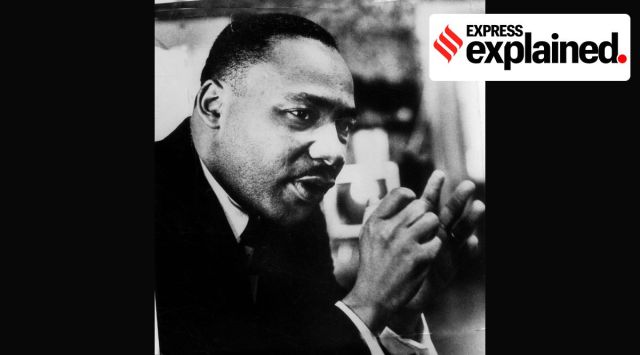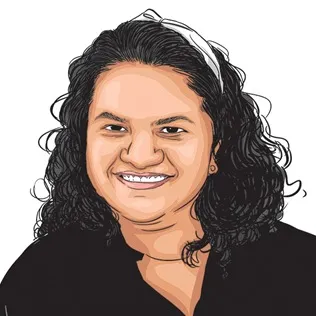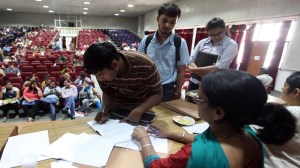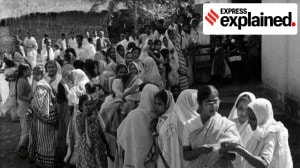- India
- International
This Quote Means: Said by Martin Luther King Jr., ‘Injustice anywhere is a threat to justice everywhere’
The line is often used to highlight the lack of socio-economic and/or political justice and also to demonstrate how various strands of society are interconnected. Understanding this quote could be beneficial in the UPSC CSE's Essay paper and the Ethics (GS-IV) portion.
 Through his words, King disposes of the notion that only the people directly affected by any sort of injustice can protest against it. (Express Archives photo)
Through his words, King disposes of the notion that only the people directly affected by any sort of injustice can protest against it. (Express Archives photo) The quote “Injustice anywhere is a threat to justice everywhere” is one among many by American Baptist minister, civil rights activist and Nobel Laureate Martin Luther King Jr, which retains their relevance even today. The line is often used to highlight the lack of socio-economic and/or political justice and also to demonstrate how various strands of society are interconnected.
With regards to the UPSC-CSE examination, understanding this quote could be beneficial in the Mains examination’s Essay writing paper, and also in the Ethics (GS-IV) portion. We dive deeper into the quote and its significance.
What is the full quote?
This quote appears in a 1963 letter King wrote from the Birmingham Jail (in the state of Alabama) that was addressed to his “fellow clergymen”. King wrote the letter as a response to members of the clergy calling his activism “unwise and untimely”. King wrote:
“Moreover, I am cognizant of the interrelatedness of all communities and states. I cannot sit idly by in Atlanta and not be concerned about what happens in Birmingham. Injustice anywhere is a threat to justice everywhere. We are caught in an inescapable network of mutuality, tied in a single garment of destiny. Whatever affects one directly, affects all indirectly. Never again can we afford to live with the narrow, provincial “outside agitator” idea. Anyone who lives inside the United States can never be considered an outsider anywhere within its bounds.” he writes.
Through his words, King disposes of the notion that only the people directly affected by any sort of injustice can protest against it – he reasons that as human beings, we are all tied to one another, and what affects one community has the potential of affecting many others.

What does the quote mean?
In the years after the US Supreme Court ruled against racial segregation in 1954 in ‘Brown v Board of Education’, tensions erupted continuously between segregationists (white supremacists) and African American communities in various parts of the American South.
Birmingham Police, at this time, was notorious for its excessive use of force and brutality. In response, King and other civil rights activists created the ‘Birmingham Manifesto’, which called for justice through both Christian and American ideals. King and his supporters also held several non-violent protests, in keeping with the spirit of the manifesto. It was during one of these protests that he was arrested for violating a state order forbidding such demonstrations.
The letter can be read as a document detailing King’s understanding of civil disobedience and also his greater vision for humanity. For him, what affects even one person directly, has consequences for everyone else indirectly. He refuses to see society in silos, each group ‘protected’ via its own insularity. This is also the idea that reinforces racism, of keeping communities as far away from each other as possible, and what King fought against his entire life.
In the letter, King also talks about the complexity of the processes of legality and justice: “Sometimes a law is just on its face and unjust in its application. For instance, I have been arrested on a charge of parading without a permit. Now, there is nothing wrong in having an ordinance which requires a permit for a parade. But such an ordinance becomes unjust when it is used to maintain segregation and to deny citizens the First-Amendment privilege of peaceful assembly and protest.”
Reading this along with the quote mentioned above, it is clear that King is also reflecting on how it is important to analyse how notions of justice overlap or diverge from what is strictly legal. If a law is being used to unfairly target individuals or a community, it must be rectified. It is not enough to think about our own benefits and selfish motives – in a democratic country, equality and equal treatment of all should be the primary concern.
Why the quote is relevant
King’s words resonate with one of the most famous World War II statements, frequently attributed to the German pastor Martin Niemöller:
“First they came for the socialists, and I did not speak out—because I was not a socialist. Then they came for the trade unionists, and I did not speak out—because I was not a trade unionist. Then they came for the Jews, and I did not speak out—because I was not a Jew. Then they came for me—and there was no one left to speak for me.”
Like King’s quote, this statement also highlights how it is ultimately the duty of everyone to speak out and act against injustice happening around them, whether or not they are directly affected.
Another less abstract way in which King’s words find resonance is through the concept of Public Interest Litigation (PIL), which incidentally also evolved during the 1960s in the US. It was formulated to provide legal representation to marginalised groups and interests because the legal services market failed to provide relevant services to large sections of the population and for issues that did not enjoy mainstream popularity.
In India, the PIL came about as a product of judicial activism. Supreme Court Justices V R Krishna Iyer and P N Bhagwati were the first to introduce the concept in India in the 1980s. Under this, any citizen or organisation can move a court for the enforcement of the rights of any person or a group who cannot access the remedies provided by the court due to material or any other kind of disadvantage.
The apex court further defined the PIL as “a legal action initiated in a court of law for the enforcement of public interest or general interest in which the public or a class of the community have pecuniary interest or some interest by which their legal rights or liabilities are affected”, in ‘Janata Dal v H S Chowdhury’ (1992). The concept of PIL thus reinforces King’s words: “Injustice anywhere is a threat to justice everywhere”.
More Explained
EXPRESS OPINION
Apr 24: Latest News
- 01
- 02
- 03
- 04
- 05









































